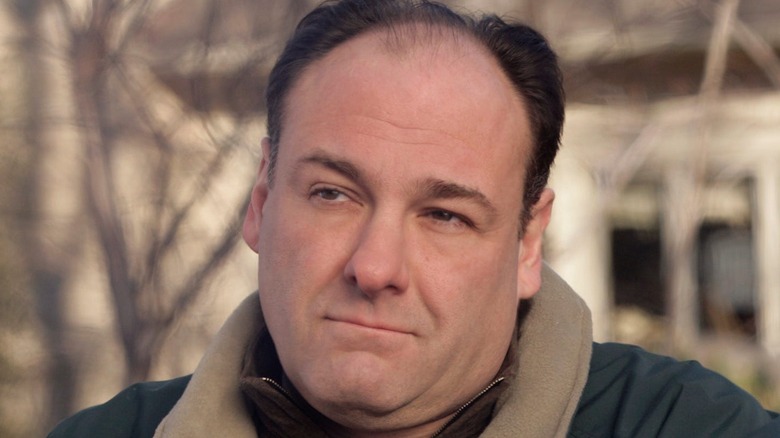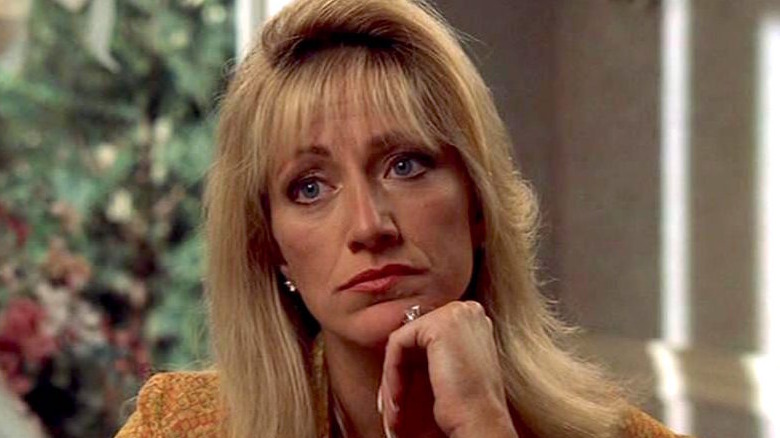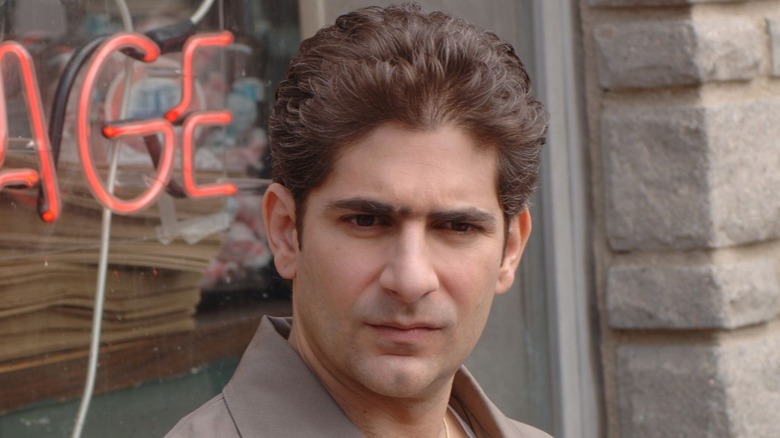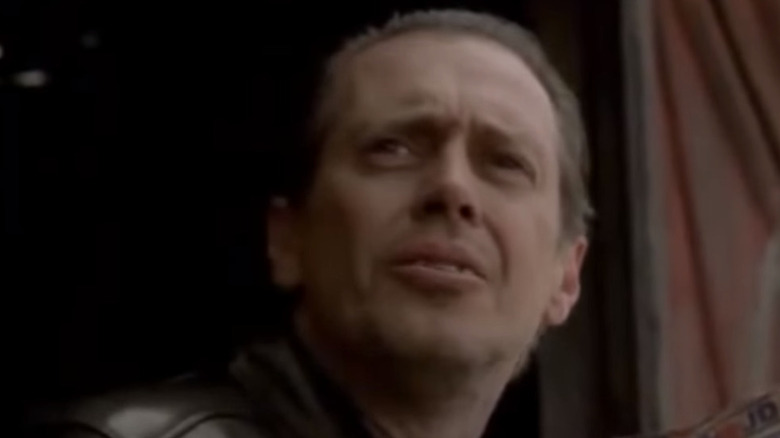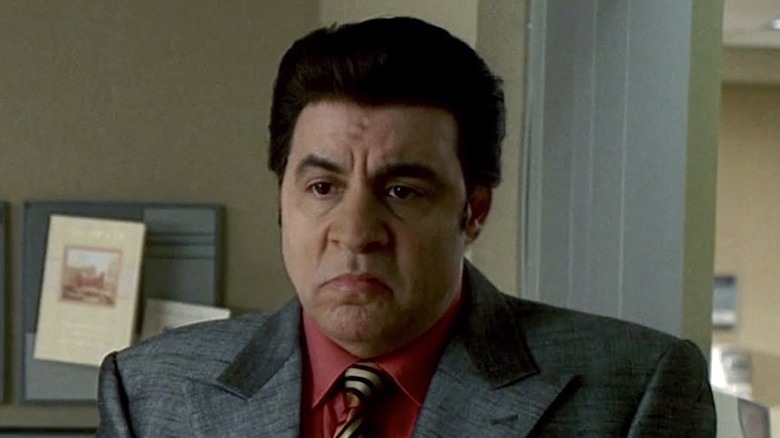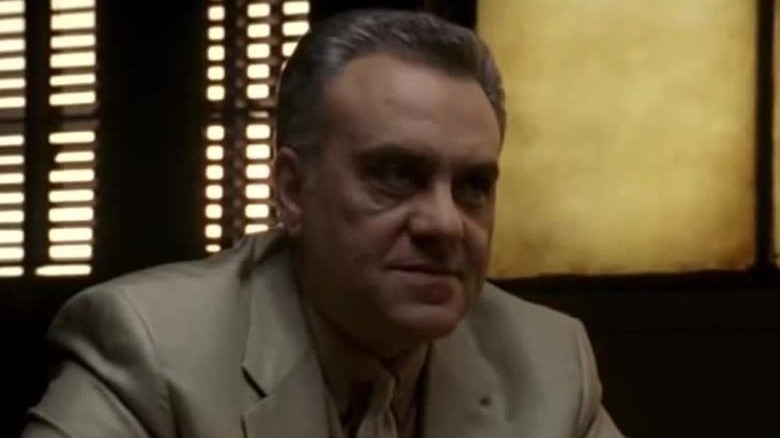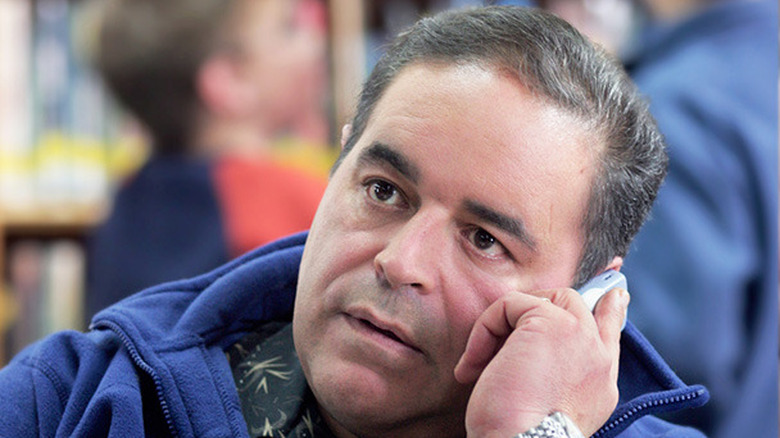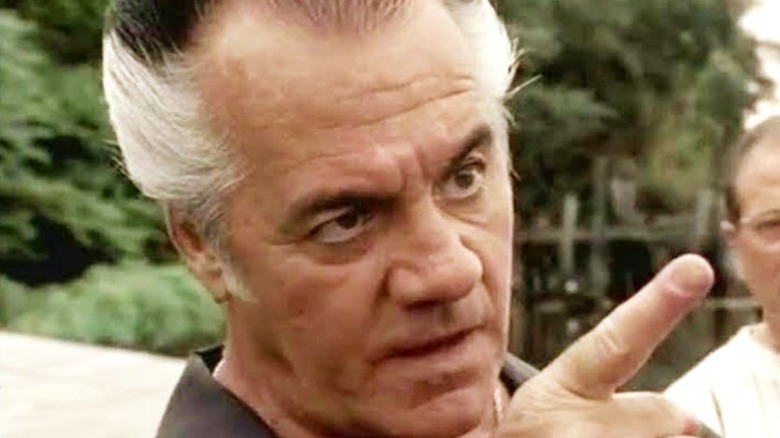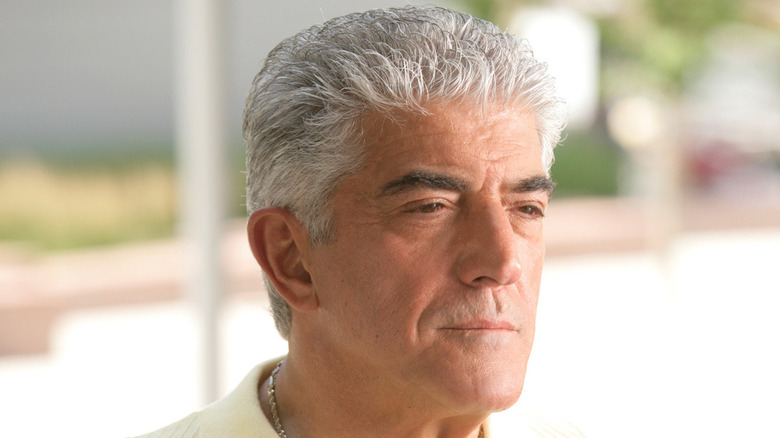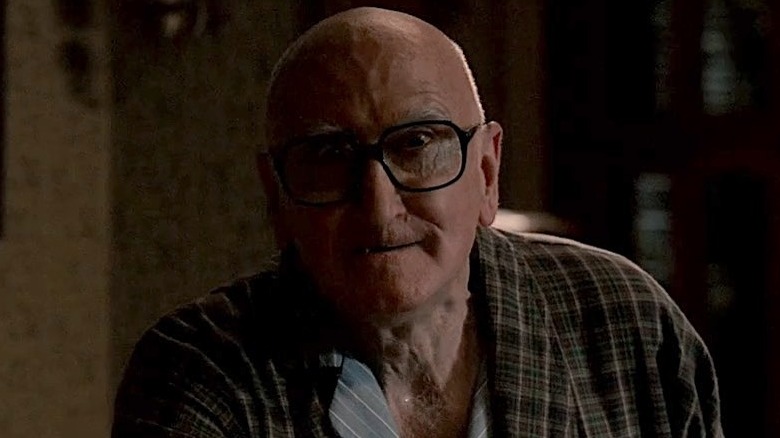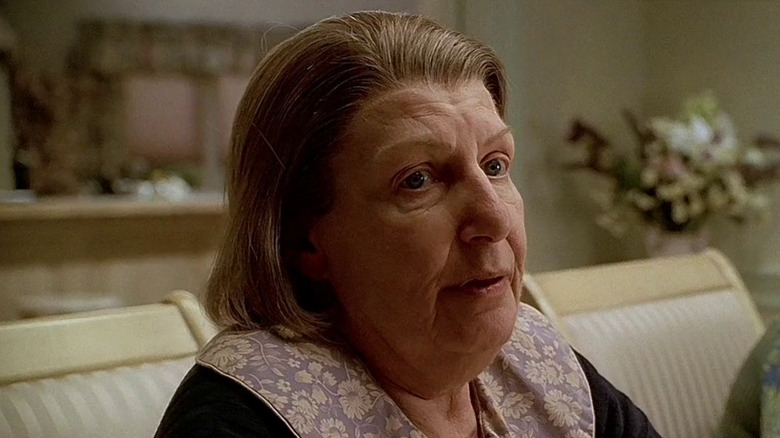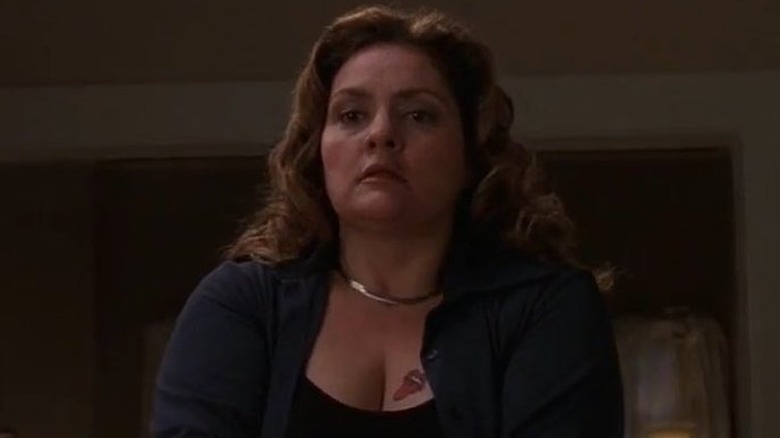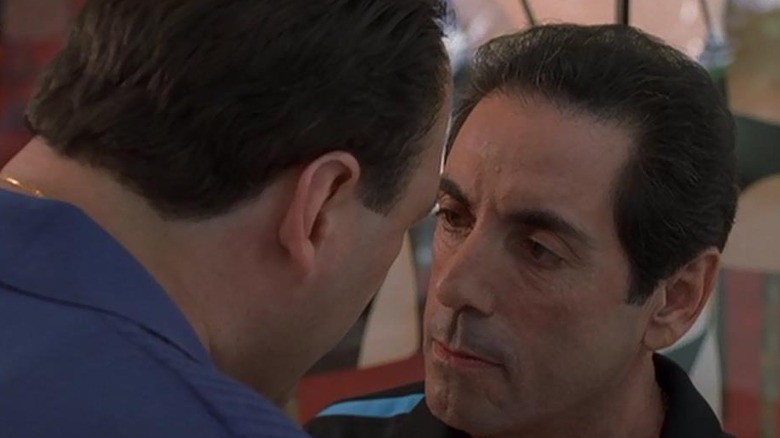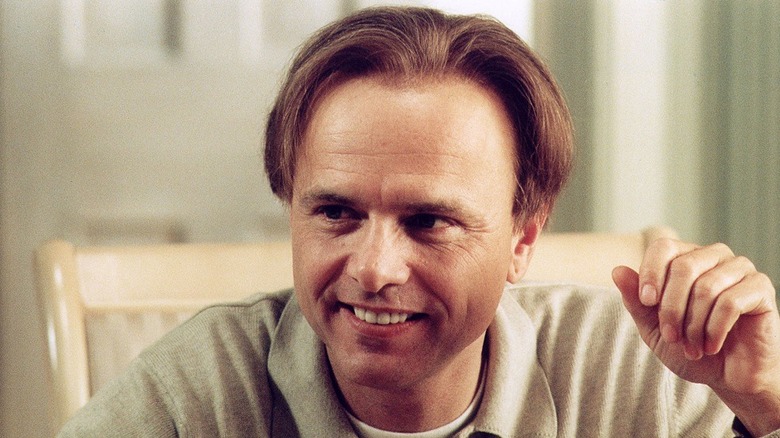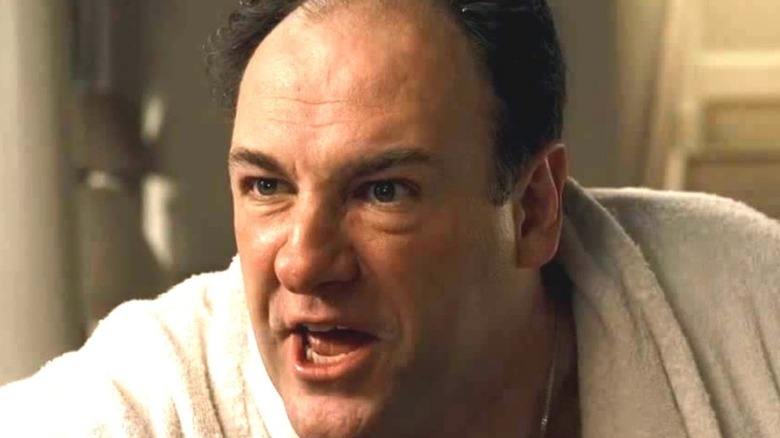The Sopranos Characters Ranked By Despicability
HBO's "The Sopranos" helped launch a golden age of television with its complex, character-driven drama centered on New Jersey-based Italian-American mob boss Tony Soprano and his struggles trying to balance his duties to his crime family and his blood family while also dealing with debilitating panic attacks. Showrunner David Chase, along with a talented crew of writers and actors, presented a rich portrait of the ways in which a mafia lifestyle — and the slow collapse of that world — can color you. It's no surprise that "The Sopranos" received so many awards and nominations, from Golden Globes to Emmys to Peabody Awards and more, and so much critical praise and recognition, during its heyday.
It's been years since the final episode aired, and now younger viewers are discovering (and obsessing over) the trials and tribulations of the Sopranos. According to the New York Times' Willy Staley, these new fans aren't just gravitating toward the show because they can relate to Tony's anxiety. They're also binging episodes because they recognize and embrace it as "a parable about a country in terminal decline." The series also boasts a large ensemble of memorable players, but it's worth noting that very few of them are actually good people — in fact, most of them are pretty awful. With that in mind, we've compiled a list of the show's most despicable characters, ranked from least to most.
14. Carmela Soprano
Carmela (Edie Falco) is far from the show's most despicable character, but she still makes the list. While Tony's devotion to his crime family and his infidelity are often a point of contention in their marriage, Carmela tries to live in willful ignorance regarding her husband's affairs. Initially, she focuses on her role as a homemaker and a mother to an observant daughter and a broody son, but she also helps perpetuate the lie that Tony built a lucrative career in waste management, making herself complicit in his crimes. The pair eventually reveal the truth to their kids when daughter Meadow starts to notice things about their world. In the process, they make the kids complicit too.
Early in the show, during confession, Carmela admits to Father Phil that her acceptance of Tony's horrible deeds is driven by her desire for her big house, the money, expensive trips, and good schools for her kids. For Carmela, the benefits and privilege trump the sin of it all, and her foreboding guilt isn't enough to change that. When Adriana La Cerva goes missing, a concerned Carmela goes to Tony with her valid worry that her friend is dead. Once he finally helps greenlight her building permits and launch her career (and his new front), though, she drops the subject and redirects her attention. By the end of the series, it's fair to say she's no longer just complicit in Tony's crimes — she's actively involved in mob affairs via her straw houses.
13. Christopher Moltisanti
While Tony's nephew Christopher may be one of the show's most sympathetic characters, there's no denying his despicable nature. It's viscerally painful to watch him struggle with addiction, and the lack of support he receives from other characters doesn't help. When Tony shatters the kid's movie-making dreams with a "me or that" ultimatum, we can really feel the heartbreak. But Christopher also beats his ever-supportive girlfriend-turned fiancée Adriana in fits of anger, and he suffocates her dog while high. Worst of all, he actively brings about Adriana's death when she admits she was harassed into becoming an FBI informant. In choosing Tony over the love of his life, Christopher knowingly assists in sending her to her grave. He even makes bitter remarks about her afterward to help maintain the lie that she skipped town and left him.
While Christopher seems to convince himself that his blood pact to the family, and his wavering status as Tony's heir, comes before everyone and everything else, the unspoken truth lies in the devastation her execution leaves behind. Post-Adriana, we learn through Christopher's conversations, actions, and final spiral back into addiction that this loss destroyed him, and his guilt haunts him until his own death. Christopher never forgives himself, and he doesn't deserve it. Despicableness aside, we're still glad that this track-suited troublemaker fulfills his lifelong dream of making a movie before he dies — even if "Cleaver" does fracture his already deteriorating relationship with his uncle.
12. Tony Blundetto
Tony Soprano's cousin Tony Blundetto, portrayed by a pre-"Boardwalk Empire" Steve Buscemi, spends 17 years in prison before he appears onscreen. When he does re-enter the world, a guilt-ridden Tony S tries to set him up with the mob — after all, before Tony B was arrested for the armed hijacking of a truck, he helped Tony S earn the money for the house the Sopranos enjoy living in. Tony B initially declines the opportunity to step back into gangster life, so Tony S sets him up with a legitimate job instead, and for a brief period, Tony B attempts to stay away from the trappings of a mafia-centered existence. He feels he's owed a good, straight life, and he's set his sights on becoming a masseuse and starting his own business.
Unfortunately, people's assumptions about him — in addition to his criminal record and the pressure he feels to either prove he can succeed on his own or join his cousin's crew — make his attempt to start anew pretty difficult. His growing anger and frustration eventually boil over. He viciously beats Mr. Kim, the boss who he planned to go into business with, before leaving his dreams behind. While working under Tony S, it's clear that he feels he's owed more upward mobility. He helped make his cousin, after all. His rage-fueled and self-destructive responses to his lack of progress (including his murder of Phil Leotardo's brother, Billy) reveal Tony B as despicably entitled.
11. Silvio Dante
Showrunner David Chase was drawn to Steven Van Zandt, a member of Bruce Springsteen's E Street Band, when he saw him give a speech at the Rock and Roll Hall of Fame. Chase instantly knew that he had to have the musician portray a character on his show (via Vanity Fair) — and Van Zandt stunned "Sopranos" viewers with his magnetic presence and signature scowl as Silvio Dante.
Throughout the series, Silvio acts as Tony's right hand man and most loyal soldier. He's willing to kill anyone the head of the family demands, without question or hesitation. A quiet and calculating misogynist, Silvio follows orders with a terrifying coldness and nonchalance. We witness the most chilling example of this in Season 5, when he murders Adriana La Cerva. When Christopher reveals her informant status to Tony, the mob boss calls her from a pay phone to tell her Christopher tried to commit suicide. He assures her that Silvio will take her to the hospital, and she's too worried to notice that she's in fatal danger. When she finally realizes why Silvio's pulled off the highway and stopped the car in the middle of the woods, she desperately stumbles from the vehicle and tries to crawl away from her fate, but a cruel and emotionless Silvio simply utters bitter, slur-filled words before firing his gun. Years later, we're still not over Adriana's death — or Silvio's role as her executioner.
10. John 'Johnny Sack' Sacrimoni
As underboss of the New York Lupertazzi Family, Johnny Sack (Vincent Curatola) is a cold pragmatist. He enjoys a civil friendship with Tony Soprano, often assisting with his schemes. When Carmine Lupertazzi Sr. dies, there's a brief internal power struggle between Little Carmine and Johnny for the newly vacated position of family head, but Johnny eventually claims the role. In the process, though, he starts to become a hot-headed, egotistical maniac who eventually betrays his friendship with Tony.
In Season 4, Johnny overhears Tony's crew making fun of his wife Ginny's weight. Ralph Cifaretto's joke about her having to get a 95-pound mole removed infuriates Johnny, who stews in his anger for a long time before demanding that he be allowed to put a hit out on the guy for such a thoughtless and disrespectful comment. Johnny's one redeeming quality might be his love for Ginny, but by the end of the series, it's clear that most of his personal relationships mean very little to him. While other characters are much luckier in their fates, Johnny pays a steep price for his sins: He loses the house that Ginny loves to Tony's sister Janice and dies of lung cancer in prison.
9. Vito Spatafore
Like Christopher Moltisanti, Vito Spatafore (Joseph R. Gannascoli) is a mob member we can actually sympathize with. His struggle as a closeted, self-hating gay man living life as a capo in the New Jersey mafia while surrounded by homophobic fellow criminals is tense and affecting. Despite his lack of romantic feelings for her, he cares deeply for his wife, and he loves his children. It's also fair to say that his shockingly violent death is one of the most upsetting moments in the show.
But none of that means that Vito's a good man. In fact, Redditors like u/Jackie_AprileSr think he's downright slimy. When Meadow's boyfriend Finn witnesses Vito getting intimate with another man in the parking lot of a construction site, Vito terrifies the kid with a mixed response of intimidation and suggestive gestures. When Vito's eventually outed, he skips town because he knows that if he doesn't, his bigoted crew members will have his head. He settles in a small, idyllic town, falls in love with the cook at the local diner (fondly known as Johnny Cakes), and almost succeeds in creating a new life for himself. But his inclination toward violence, his self-hatred, and his inability to stop killing stands in the way. In the end, he returns to New Jersey because he misses his crime life too much to leave it behind. Unfortunately, his nostalgic desire for the world he once knew gets him killed.
8. Peter Paul 'Paulie Walnuts' Gualtieri
Paulie (Tony Sirico) may be Tony Soprano's biggest earner, but he's also constantly skimming money off the top of those earnings. He causes a lot of headaches and leaves his boss with a lot of messes to clean up over the years. At one point, Tony takes Paulie out on a boat with plans to kill him because of all the trouble he's caused. Described by Redditors like u/Dexterthedoberman as a cockroach, it's clear that Paulie's an impulsive opportunist who will readily go against orders if it seems personally advantageous to do so. A notable example of this is when he decides to kneecap Jason Barone despite Tony's promise to Barone's mother that no harm would come to her son. When Christopher Moltisanti, post-gunshot, confesses that he thinks he visited Hell, which he describes as an Irish pub where it's St. Patrick's Day every day, Paulie assures the younger man he was just in Purgatory. Paulie believes he'll only have to put in 6,000 years there before he's accepted into Heaven. He also thinks, because of his bulky Church donations, God is obligated to do good things for him. Given Paulie's track record of screwing people over, we have to say we have some serious doubts.
7. Phil Leotardo
Even among his fellow gangsters, Phil Leotardo (played by the late Frank Vincent) is a particularly horrifying and remorseless killer. Under the orders of Johnny Sack, Phil harasses female mobster Lorraine Calluzzo while she's out loansharking, waltzing into the shop where she's collecting money and mock-executing her by pressing a thick phone book against her head and firing a gun. The bullet gets wedged in the pages, leaving Lorraine breathing but shell-shocked — all in a failed attempt to get her to kick up her money to Johnny rather than Little Carmine.
Phil may just consider this simple business, but that doesn't change the fact that he takes great pleasure in seeing that she emptied her bowels in her terror. Phil's cruelty toward Lorraine only escalates, eventually culminating in his brother humiliating and murdering her while she's naked in her own home. Sadistic, misogynistic, and extremely homophobic, he's also directly responsible for Vito's brutal death. We'd say that a man who enjoys enacting torturous and fatal hate crimes is objectively a pretty despicable person.
6. Corrado John 'Junior' Soprano, Jr.
Uncle Junior is essentially one of "Sopranos" Season 1's Big Bads and a continuous thorn in Tony's side. While Tony is his nephew, Junior's disdain for the younger man is quite clear. When Tony's mother Livia (who also happens to be Junior's love interest until the day she dies) suggests putting a hit out on her own son, Junior doesn't even hesitate to put those wheels in motion. Tony's status as a blood relative and the new head of the family matters very little to the aging gangster. He'd much rather be acting boss, and if that means taking Tony out, then that's what he's prepared to do. Unfortunately for him, that plot fails miserably. Later in the show, Junior actually shoots Tony while in a deteriorating mental state, and he exhibits no remorse about it even when he's clear-headed and aware. Toward the end of the series, it's also heavily suggested that Junior was the second shooter in the assassination of John F. Kennedy.
5. Livia Soprano
According to Herald-Mail Media, Livia Soprano was inspired by David Chase's own mother. Livia comes across as a pretty miserable person, and throughout the series, we start to understand how life as a mob wife and her struggles with depression shaped her. But we also understand Tony's justifiable contempt for his emotionally manipulative mother. A racist old woman with an acidic tongue who accuses housekeepers of stealing her things even though she's constantly giving her material possessions away, Livia grates on almost everyone except for Junior. She demands sympathy via her self-proclaimed victimhood, and she has a laundry list of complaints prepared for anyone who might listen or ask after her. The unforgivable act that puts her toward the top of this list of despicable characters? The bounty she puts on her own son's head. Sure, Livia can try to claim that she didn't know what she was doing, as she does in conversations with Junior. She can even try to claim that she played no part in the plot to have Tony whacked, as she does in conversations with her son and others. But while the characters are witness to her apparent mental decline, they can also see right through her lies.
4. Janice Soprano Baccalieri
Tony's sister Janice (Aida Turturro) takes after her mother Livia; throughout the series, we see her manipulate her way into mob life. Her first attempt is with Richie Aprile. Aspiring to become the wife of a mafia boss, Janice uses her intimate relationship with Richie to influence him. She encourages Richie to try and usurp her brother, but these attempts ultimately prove fruitless, and her life with Richie comes to an abrupt end when she's driven to shoot him multiple times after he punches her in the face for suggesting that it's okay for his son to be a gay ballroom dancer.
After she recovers from the trauma of killing her violent partner, Janice finds a little more success — and a healthier relationship — with model-train-loving Bobby Baccalieri. When Bobby loses his first wife to a car accident, Janice sees a golden opportunity and bullies her way into his life. Along the way, she takes out a home equity loan on her mother's house, sells secrets about Ralph Cifaretto's unique bedroom interests to Tony, and infuriates the Russian mob by stealing a woman's prosthetic leg — and that's really just the tip of it.
3. Richie Aprile
Upon his release from prison, the despicable Richie Aprile tracks down his old partner, Peter "Beansie" Gaeta, and tries to extort money. When this doesn't really work, Richie decides to run Beansie over with his car, breaking his legs. His cold and distinct hatred of Christopher Moltisanti — which, to be fair, is prompted by the fact that Christopher is abusive toward Richie's niece Adriana — is so widely known that a couple of goons with gangster pipe dreams try to whack the younger man for him. When Janice suggests that there's nothing wrong with Richie's son being gay (or a dancer), and that he should support his child, Richie's so unbelievably angry at the mere thought that he hits her and then calmly sits down at the table to eat the dinner she cooked, acting like nothing happened. Janice is soon pointing a gun at him in stunned and frenzied retaliation, but Richie's so self-assured in his status as a powerful criminal that he can't even fathom her pulling the trigger until it's too late.
2. Ralph 'Ralphie' Cifaretto
Ralph Cifaretto is the kind of guy who's always looking for a way toward more power and more money, but his ridiculously short fuse often gets in the way. Even his mafia co-workers think Ralph's a little too unstable, unpredictable, and quick-tempered to be trusted. After his brief sexual relationship with Tony's sister Janice, Ralph impregnates Tracee, the stripper he's been seeing who works at the Bada Bing. In the club parking lot, Ralph makes a nasty comment about how he hopes their baby is a boy, because if the baby's a girl, they'd have to name her Tracee, and she would grow up to be exactly like her mother. Horrified by his cruelty, Tracee slaps Ralphie, and it's the last thing she ever does: A furious Ralphie responds to the provoked slight by viciously beating her to death. Also worth noting: he murders Pie-O-My, the racehorse Tony Soprano steals from him and comes to adore, for the insurance money.
1. Tony Soprano
Sure, Tony Soprano is charming, charismatic, and likable. His anxiety is relatable. He cares deeply for animals, and he's often more upset over their deaths than those of the people around him. In addition, the actor who portrays Tony, the late Joseph Gandolfini, paid his co-stars with his own money while they were in the midst of contract negotiation conflicts with HBO. What's not to like about all of that? As viewers, Tony Soprano is the kind of main character we often want to root for. But that doesn't change the fact that he's arguably the most despicable character of all.
Throughout the show, Tony threatens everyone in his family with violence, and he does eventually hit his son AJ — and he murders his nephew Christopher. He's a womanizer and a serial cheater, and he even drives one of his lovers to suicide. The anxiety attacks Tony suffers often come as a result of him doing something terrible or something bad happening around him. In a way, we might even consider his anxiety as a stand-in for his own conscience. His Jiminy Cricket, if you will. For six years, Tony tries to use therapy sessions to suppress his anxiety, but the drive isn't to become a better person and live a happier life. He's simply trying to make his career as a mob boss a little easier.
